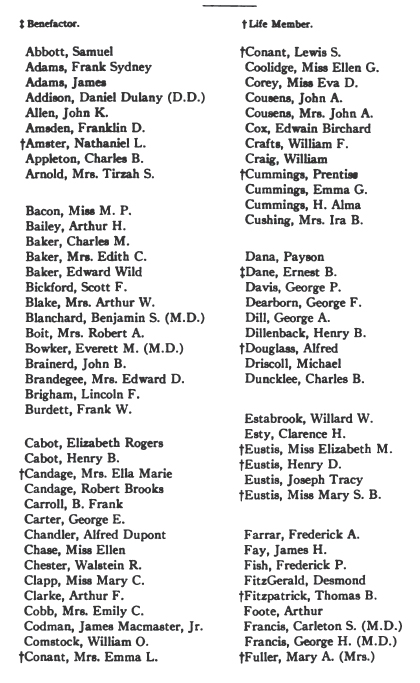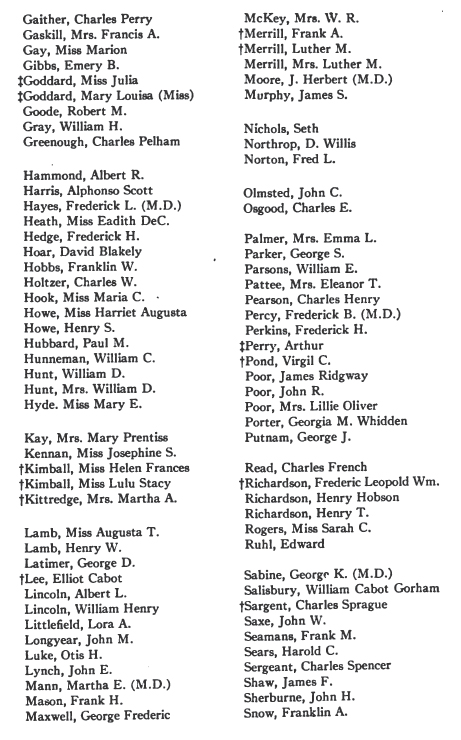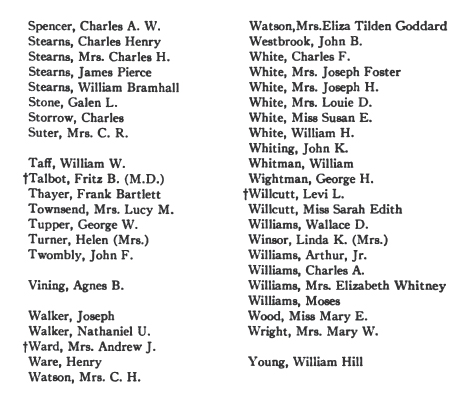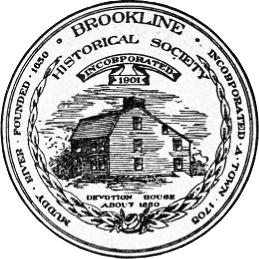
PROCEEDINGS
OF THE
BROOKLINE HISTORICAL SOCIETY
AT THE
ANNUAL MEETING, JANUARY 24, 1917
BROOKLINE, MASS.
PUBLISHED BY THE SOCIETY
MCMXVII
Committee on Papers and Publications.
OF THE
BROOKLINE HISTORICAL SOCIETY
AT THE
ANNUAL MEETING, JANUARY 24, 1917
BROOKLINE, MASS.
PUBLISHED BY THE SOCIETY
MCMXVII
Committee on Papers and Publications.
William O. Comstock
Charles F. White.
Charles F. Read.
Charles F. White.
Charles F. Read.
Contents:
- President's Address
- Report of the Treasurer
- Report of the Nominating Committee
- Burials and Inscriptions in the Walnut Street Cemetery. Part Two
- Officers and Committees
- List of Members

Walnut Street Cemetery
BROOKLINE HISTORICAL SOCIETY
SIXTEENTH ANNUAL MEETING.
SIXTEENTH ANNUAL MEETING.
The sixteenth annual meeting of the Brookline Historical Society was held in the Edward Devotion House, Brookline, on January 24, 1917, at 8 p.m., in accordance with a notice mailed to every member. President Charles H. Stearns was in the chair.
The record of the last monthly meeting was read and the President then delivered his annual address.
Members of the Brookline Historical Society and Friends: -
We are permitted to come together at this our sixteenth annual meeting and rehearse the various changes that have happened to us as a society, and as citizens of this goodly town. During the past year eight members have died, seven members have resigned, mostly by reason of their moving from town, and our present membership is as follows:
Annual members: 181
Life members: 23
Benefactors: 4
Total: 208
Life members: 23
Benefactors: 4
Total: 208
The following members died in 1916:
Charles A. Hopkins: January 28
Frederick L. Gay: March 3
Joseph McKey: June 10
J. Henry Woods: November 16
Charles H. Utley: November 21
Jerome Jones: December 13
Andrew M. Ritchie: December 25
Emeline C. Ricker: December 31
Frederick L. Gay: March 3
Joseph McKey: June 10
J. Henry Woods: November 16
Charles H. Utley: November 21
Jerome Jones: December 13
Andrew M. Ritchie: December 25
Emeline C. Ricker: December 31
Charles A. Hopkins, or, as he was popularly known, Colonel Hopkins, came to Brookline in 1888, and lived first on Park Street. He afterward built the fine mansion on Rawson Road, where he lived until about three years ago. He was in the life insurance business, and was active in the Harvard Church. He had traveled extensively and was a most agreeable man to meet.
Frederick L. Gay moved to Brookline in 1891, and lived for some years on Fisher Avenue in one of the Jacob Pierce houses. He afterward built and lived in the beautiful home on Holland Road. His house is nearly on the top of Fisher Hill, and commands an extensive and lovely view to the north. Mr. Gay in later years was not in active business, but he had a great love for historical research.
Joseph McKey built a house on Steams Road and moved there in 1896. He was born in England and had been in business many years in St. Paul, Minnesota. He was a constant attendant at our meetings, and was one of our directors. He had crossed the Atlantic many times, was an extensive reader and a pleasant companion. He will be greatly missed.
J. Henry Woods, M.D., came to Brookline from Barre in 1886. He was a physician and settled first on Harvard Street near School Street. He afterward built and lived in a house on Salisbury Road. Dr. Woods was a most genial man, kind and courteous in his manner, and endeared himself to all who knew him.
Charles H. Utley came to Brookline about 1880. He lived for some years on Francis Street, then moved to Toxteth Street, and for the past ten or twelve years lived on Regent Circle. Mr. Utley was much interested in town affairs, and had represented the town in the General Court. He was in the provision business, was president of the Quincy Market Cold Storage Company, and was interested in other large concerns.
Jerome Jones was one of the best-known residents of Brookline. Coming here in 1876, he was interested in the good of the town, and though not caring for office, he had been on many committees looking to the improvement of the town. He was a member of the committee to consider the purchase by the town of the old Brookline Reservoir, and strongly advocated this measure. Probably this purchase and its use as a public park was one of the most beneficial measures the town has ever enacted. Mr. Jones was a busy man, at the head of a large and prosperous business, and could ill afford time to devote to outside considerations. He will long be remembered as a public-spirited and conscientious citizen.
Andrew M. Ritchie came to this town as a young lad with his father about 1857. He afterward went into business with his father and brothers, as a manufacturer of fine and delicate instruments, making a specialty of ships' compasses. Their factory on Cypress Street near the railroad has been a landmark for many years.
Mrs. Emeline C. Ricker was a corresponding member of our Society. Her maiden name was Tolman. She lived in her younger days in a house which is' still standing on Washington Street near Cypress Street. Her father, Charles Tolman, was a shoemaker and had a shop on the site now occupied by stores on the corner of the above-named streets. After Mr. Tolman's death, James Rooney, who had worked for Mr. Tolman, carried on the business. Mr. Rooney soon after built the buildings on Harvard and Kent Streets and moved the store there. Hans A. Peters now occupies this store. The Tolman house is one of the old houses of the town. It was considerably changed in its outward appearance a few years ago.
We have had eight meetings during the year 1916:
January 26. The annual meeting with reports and election of officers. The president read his annual report, giving list of deaths of members, a summary of the meetings of the year, and an account of some of the changes in the town.
February 23. Frank E. Woodward of Wellesley Hills, president of the Massachusetts Society, Sons of the American Revolution, read a paper on "Washington the Soldier." Mr. Woodward gave a picture of Washington different from that generally presented, showing him as a fighter and strategist, sometimes mistaken, but always hopeful and persistent. It sometimes seemed as if the Almighty were on the side of the American Army, it often being in hazardous situations from which only the neglect or the indifference of the enemy made it possible for our anny to escape or to be victorious.
March 29. Harry A. Gray read a paper entitled "Substitute Currency in Boston during the Civil War." Mr. Gray exhibited a book containing hundreds of examples of the different substitutes for cash in vogue, which were rendered necessary on account of the scarcity of specie currency. These paper substitutes, or "shin plasters," as they were called, were a great nuisance and an actual hindrance to retail business, particularly to those in small produce trades. At one time recourse was had to postage stamps, which in warm weather would stick together, and it was very trying to the patience and stimulated the verbal expressions of the traders.
April 27. Walter Kendal Watkins gave a paper on "Travel on Boston Post Roads." We are always glad to hear Mr. Watkins, he is such an encyclopedia of historical knowledge. He gave descriptions of the various post roads in the old days, north, south, east, and west of Boston, with an account of the then prevailing method of travel, and the noted taverns on the roads. He spoke of the old Punch Bowl Tavern in Brookline Village, and also of what was known as the Richards Tavern on Heath Street, at the corner of Hammond Street, a building which is still standing.
May 31. As usual, the May meeting was held in the Grand Anny room in the Town Hall. The address was by Dr. Philip A. Nordell of Brookline, who had for his subject, "The Grand Anny of the Republic: Its Aims and Achievements." Mr. Nordell, as Assistant Adjutant General, Department of Massachusetts, G. A. R., is well qualified to speak on this subject, and he gave us a most interesting account of the beginnings and doings of the order. Several of the old soldiers were present.
October 18. Marshall P. Thompson of Brookline addressed the society on "The Struggle for American Independence in the British House of Commons." This was a side of revolutionary history that is not familiar to the average person, and Mr. Thompson gave a graphic account of the varying feelings in the English Parliament during that struggle, and of how greatly the success of the American Army depended upon the Liberals in the House of Commons.
November 22. John C. S. Andrew of Revere gave an interesting paper on "Benjamin Thompson, Count Rumford, a great American Scientist." Mr. Andrew told of the youthful life of this remarkable man spent in the country surroundings of New Hampshire, and of his rise to being one of the celebrities in applied science. He was better known abroad than in his own country, and in Munich there is a statue of him erected because of the great benefits which the city acquired from his inventions.
December 27. We were favored by an interesting address by Mr. Watkins, entitled "Three Centuries of Land Improvements in Boston." Beginning with the water line of the north of the city, he told of the changes, principally by filling, of the east, south, and the west sides. The greatest change has been on the west side, where the original water line was along the line of the present Charles Street. The filling has been made so that all of the so-called Back Bay, and along the lines of Beacon Street extended, has been redeemed from the flats and marshes which used to be conspicuous as appertaining to Boston. Much of the above has been known and is familiar to the older members of our Society.
The interest in our meetings is well maintained, and the speakers are well appreciated.
A number of changes in the old estates of the town during the past year are to be noted. The beautiful lawn of the Ferris estate on Harvard Street and Alton Place has been sold, and is now covered with brick apartment houses, with a range of garages in the rear. This lawn has been one of the beauty spots of Harvard Street; with its closely-mowed surface and the quantities of birds that were wont to flock there, it was a most restful and pleasurable place. For a number of years an invalid lady, the last of a large and opulent family, had lived in the mansion house with attendant and servants; she passed away about a year ago. With the advent of these apartment houses, thirty-three families now occupy the estate. It is rumored that the rear of the lot is to be occupied by a girls' school.
The vacant land on Steams Road and Littell Road has been sold, and is now covered with apartments. This was a part of the Steams farm, which your president in his younger days used to till. The large lot in Pleasant Street and St. Paul Street, adjoining the playgrounds of the Noble and Greenough School, has been sold, and the old house which has stood there for nearly seventy years has been moved across Pleasant Street to a lot on the Copley Green estate. This house was first occupied by a Mr. Stackpole, then by Edward D. Sohier, a noted lawyer of that period, who was succeeded by his son-in-law, Theodore Metcalf, the founder of the Metcalf Pharmacy; and for a number of years E. Sumner Mansfield has lived there. Twenty-eight apartment houses are to occupy this lot.
There have been wonderful changes in that part of Brookline, and on the land in Boston lying between Commonwealth Avenue and Charles River. This large tract of land in Brookline, embracing several hundred acres, was for many years almost an unknown region to the rest of the town, with its woods, hills, and valleys, its few scattered buildings that could be counted on the fingers of one hand, - these hundreds of acres with almost no transportation facilities have preserved their country conditions until, by the widening of what was Brighton Avenue, now Commonwealth Avenue, with its electric trolley lines, they have been completely transformed, and the whole surface changed by leveling and filling. Residences by the hundreds, great buildings for the automobile trade, the largest armory in the State, an immense publishing house, and one of the biggest baseball fields in the country now possess the land.
Another change is in the estate formerly owned by John F. Winch on the corner of Harvard and Green Streets. The larger part of this estate has been sold, the house moved to one side, and a block of one-storied stores has been built. Another large block of stores has been built on the corner of Washington and Beacon Streets. It would seem as if this class of buildings were increasing faster than the needs of the people warrant.
At a town-meeting held in July last, it was voted to buy a tract of land on the southerly side of Summit Avenue, on the top of Corey Hill, for park purposes, thus preserving to the citizens perpetually the views to the south and west, as well as those to the north and east. The project for this purpose has been before the town at several previous meetings, but has been defeated, avowedly on account of the expense. The town is to be congratulated that this lovely view, taking in the Blue Hills and the Chestnut Hill Reservoir, is to be preserved.
Another change which as yet is apparent only on paper is the transfer of the greater part of the Blake estate to a syndicate, which proposes to open roads, and cut up and sell for house lots this beautiful park. This fine stretch of hill and dale with sturdy trees, in the heart of the town, has been one of its greatest assets. The prospectus of the new owners promises to layout the roads and lots retaining as many of the trees as possible; but it is a cause for regret that this tract has passed from the control of one able to maintain it in its entirety.
The telephone shows the wonderful growth of what twenty years ago was reckoned as a luxury and is now a necessity. Beginning in a little room in what was known as the Joyce Building, but really the old Baptist Church, which stood where Rhodes Bros.' store is located, the New England Telephone Company moved in 1901 to a brick building on Aspinwall Avenue, which was considered a remarkable growth in the business. In 1912 another building of the same size was erected as necessary to take care of its greatly increased business, and in 1916 the Goodspeed estate on Marion Street, adjoining the Harvard Church, was purchased by the Company.
The wooden buildings have been torn down and an immense fireproof structure is in process of erection for another exchange.
During the year the Harvard Church has made a large addition to its buildings to take care of its increasing church activities; and the Second Unitarian Society has dedicated a fine Colonial meeting-house on the corner of Charles Street and Sewall Avenue.
The new town-meeting act and precinct voting has had a year's trial and seems to fulfill its purpose, which was chiefly to have representative voters, chosen from all parts of the town, take the place of the overcrowded town-meetings, where free discussion was almost impossible. There has been a marked change for the better, and the various matters have had due consideration. Other towns are watching our results, and at the last town-meeting several citizens of Watertown came to the hall to watch proceedings. As it happened, there was no subject on the warrant which called for discussion, and the whole business was disposed of in about eight minutes.
CHARLES H. STEARNS.
January 24, 1917
January 24, 1917
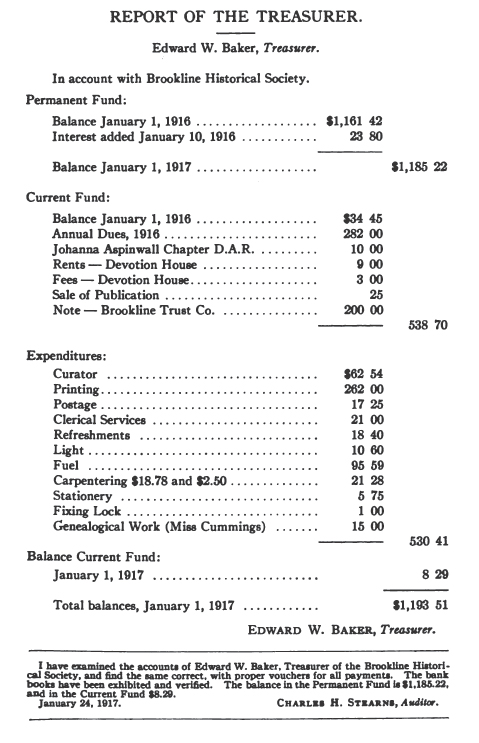

OF
BROOKLINE, MASSACHUSETTS,
WITH
HISTORICAL SKETCHES
OF
SOME OF THE PERSONS BURIED THERE,
COMPILED BY
HARRIET ALMA CUMMINGS
BROOKLINE, MASSACHUSETTS,
WITH
HISTORICAL SKETCHES
OF
SOME OF THE PERSONS BURIED THERE,
COMPILED BY
HARRIET ALMA CUMMINGS
PART TWO
[Editor's Note: The 1917 proceedings contain part two of the burial data. Pending our transcription of these data we refer you to the work already completed by the High Street Hill Association

